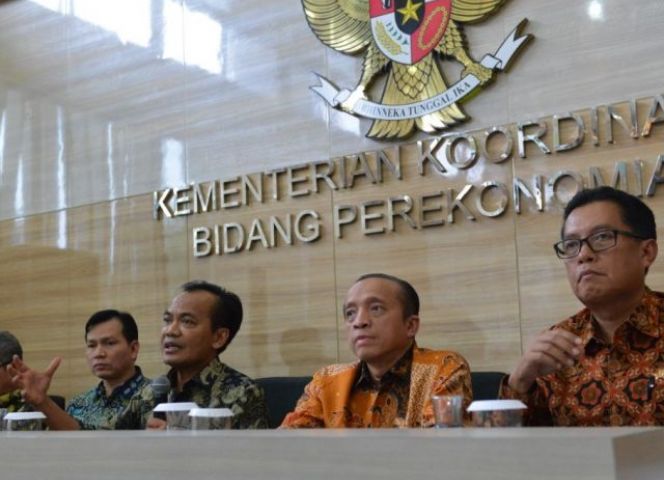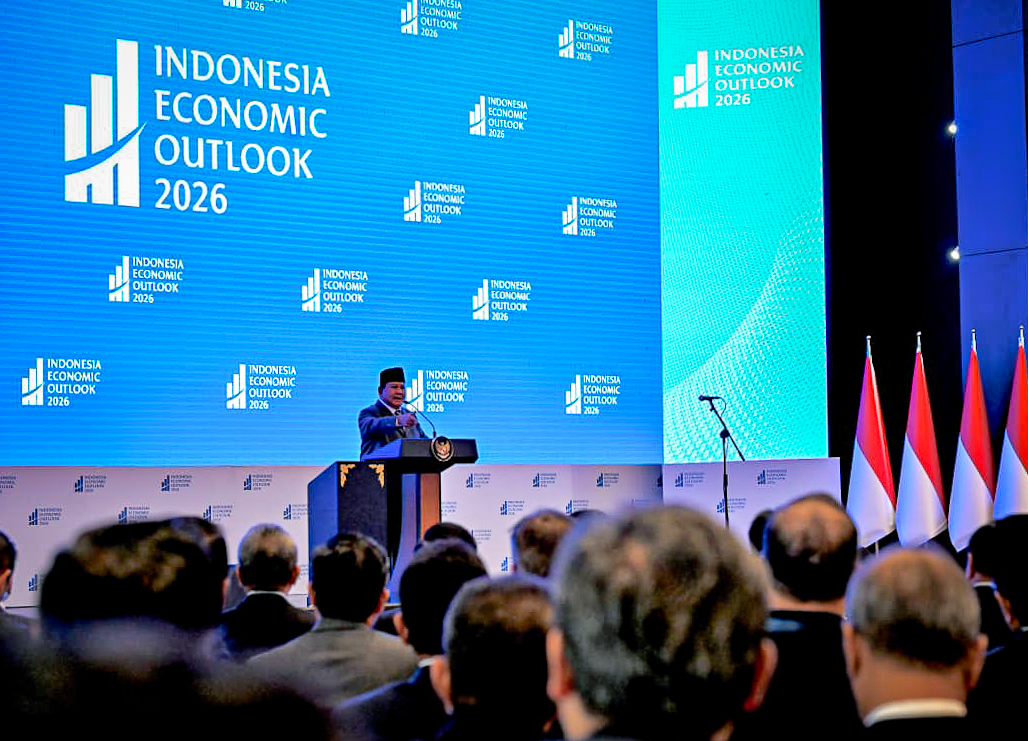Job Creation Bill to Improve Indonesia’s Economic Growth

Coordination Meeting at the office of Coordinating Ministry for the Economy, Jakarta, Friday 24/1. Photo by: Coordinating Ministry for the Economy.
Indonesia’s recent economic growth is approximately 5% per year with an investment realization of Rp601.3 trillion (data from quarter 3 of 2019).
On the other hand, there are several overlapping regulations, low investment effectiveness, limited empowerment of Medium, Small, and Micro Enterprises (MSMEs), and 7.05 million people unemployment. The addition of a new workforce is 2 million people every year, and some 57.26% or 74.1 million of the total workforce are workers in the informal sector, while the Gross Domestic Product (GDP) per capita per month is recorded at Rp.4.6 million.
Indonesia’s economic growth is targeted to reach 6% per year to be able to accommodate two million new workers. This requires new investment of Rp4.800 trillion (1% of economic growth is estimated to require Rp800 trillion investment). The investment will come from the Government, State-Owned Enterprises (SOEs), private sector, domestic investment (PMDN) and foreign investment (PMA).
In a bid to achieve the aforementioned target, the Government has initiated Job Creation Bill with Omnibus Law method. The Law aims to simplify and synchronize regulations and business permits, improve investment quality, create higher quality jobs, improve workers’ welfare, empower the MSMEs sector, improve the people’s economy, and achieve GDP per capita of Rp7 million per month.
The measure is in line with the vision of “A Developed Indonesia 2045” which set the nation to reach the top five of the world economy, with an extreme poverty rate of zero percent, highly qualified employment and GDP per capita per month of Rp27 million.
Omnibus Law is a method used to replace and/or revoke Law or some provisions in Law. Previously, there were several laws that had applied the concept, such as Law Number 9 of 2017 on Enactment of the Government Regulation in Lieu of Law (Perppu) Number 1 of 2017 on Access to Financial Information for Taxation Purposes that revokes several articles in several Laws.
Based on data from the Ministry of Law and Human Rights (as of 23 January, 2020) there are 8,451 Regulations from Central Government and 15,965 Regulations from regional governments in Indonesia. This illustrates the complexity of regulations in Indonesia. The Job Creation Bill is expected to reduce and even eliminate overlaps among laws and regulations (PUU); improve efficiency of amendment/revocation process; and eliminate sectorial ego.
As of 24 January, 2020, there are 81 Laws that were affected by the Job Creation Omnibus Bill. The Bill is classified into 11 clusters, namely Simplification of Licensing; Investment Requirements; Employment; Ease, Empowerment, and Protection of MSMEs; Ease of Doing Business (EoDB); Research and Innovation Support; Government Administration; Imposition of Sanctions; Land Procurement; Government Investment and Projects, and Economic Zones.
The Job Creation Bill has been included in the 2020 National Legislation Program (Prolegnas) in the House of Representatives (DPR) since 22 January, 2020.
Next week, Coordinating Minister for the Economy and Minister of Law and Human Rights will meet with President Jokowi to discuss the latest progress of the Omnibus Law, and there will possibly be a Limited Cabinet Meeting on approval from the President and related ministers of the draft and the academic draft of the bill.
Secretary of the Coordinating Ministry for the Economy Susiwijono said that “once (the Bill) is signed and the Presidential Letter (Supres) is sent to the DPR, it will be discussed in a plenary session, then it will be discussed publicly,” he said.
Secretary-General of the Ministry of the Environment and Forestry (LHK) Bambang Hendroyono explained that the Environmental Impact Analysis (EIA) will be included in the Bill, including for business licenses, especially for businesses with high risk to the environment. “In the Job Creation Bill, the measure to improve investments also takes into account environment, economy and social aspect. The concept is risk based approach, and Law Number 32 of 2009 (on Environmental Protection and Management) is synchronized without changing environmental principles. This is in accordance with the principles of bureaucratic reforms,” he said.
Secretary-General of Ministry of Agrarian Affairs and Spatial Planning/the National Land Agency (ATR/BPN) Himawan Arief Sugoto explained that the Job Creation Bill will accelerate land acquisition. Land bank will be established to ensure the availability of land to create new job opportunities.
Secretary-General of the Ministry of Manpower Khairul Anwar stated that the calculation of severance pay for workers affected by termination of employment (PHK) is still the same as before. Contract employees will also be compensated as permanent employees, but with a different calculation. The minimum wage will still be applied and cannot be deferred, especially for workers who work under a year. For the workers who have worked more than one year the calculation will be adjusted to the wage scale in each company. Meanwhile, hourly wage will apply to special jobs, for example in the digital economy or consultancy.
“The Government is committed to expanding and developing employment opportunities, so that the workforce will easily find work,” he said.
Expert Staff on Economic and Political, Legal and Security Relations of the Coordinating Ministry for the Economy Elen Setiadi also said that the Employment Creation Bill did not include an article stating that the Minister of the Interior could dismiss regional leaders. The provision, he added, has been regulated in Article 68 of Law Number 23 of 2014 on Regional Government. “Meanwhile, halal product guarantee is included in business permit simplification cluster, by providing ease for halal certificates, and not eliminating the requirements,” he concluded. (Public Relations of the Coordinating Ministry for the Economy/EN)
Translated by: Ridwan Ibadurrohman
Reviewed by: Yuyu Mulyani








